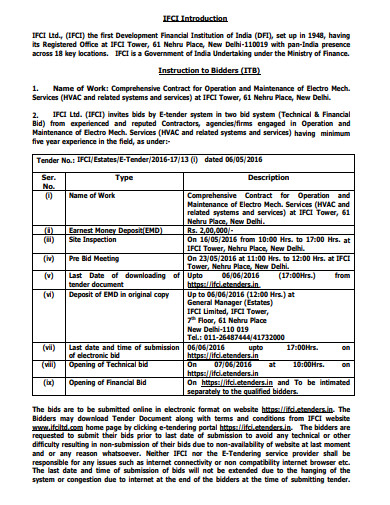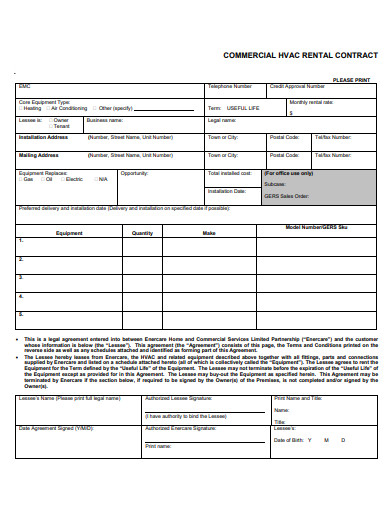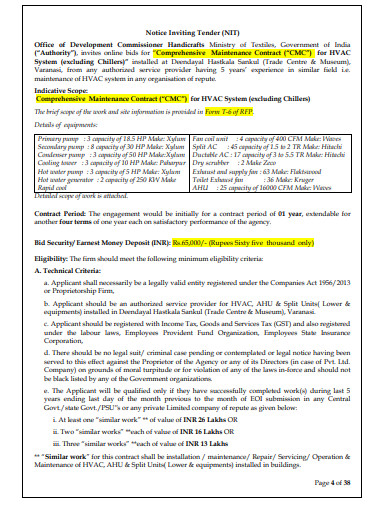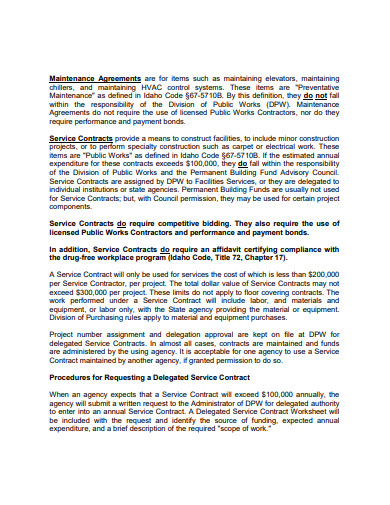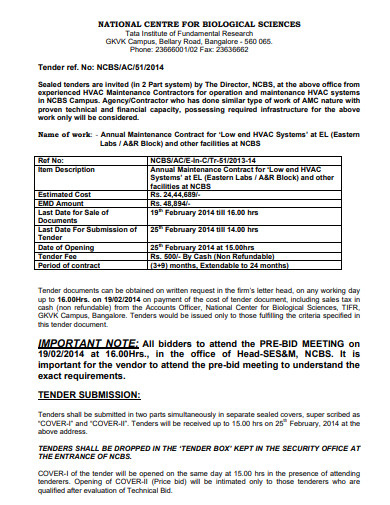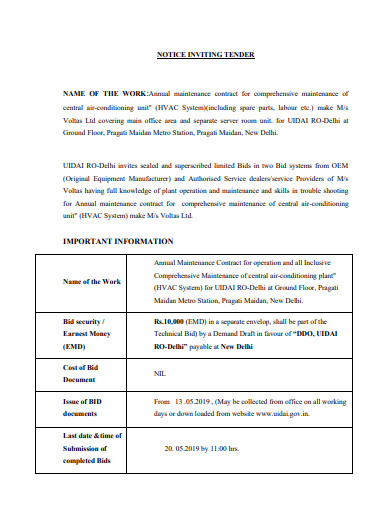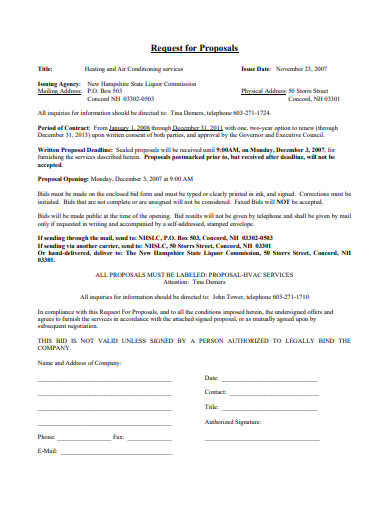7+ HVAC Contract for Services Examples to Download
Heating, Ventilation, and Air Conditioning (HVAC) systems are important in both residential homes and commercial buildings. They play vital roles in the management of residence and workplace temperatures to ensure the comfort of the individuals in those spaces. Today, service works, like HVAC installations, maintenance, and repairs, are in-demand. In fact, Mordor Intelligence’s report states that the compound annual growth rate (CAGR) of the industry stands at 12.5% for the forecast period of 2020-2025.
The same source pointed out that the main driver of the ongoing growth is the concurrent growth of the construction industry. If you are one of the stakeholders of an HVAC company, then you better start writing contracts because this year will be a busy one. Get a clearer picture of the document by browsing our Free 7+ HVAC Contract Examples for Services in PDF, Microsoft Word, Google Docs, and Apple Pages file formats.
7+ HVAC Contract Examples for Services
1. HVAC Service Contract Example
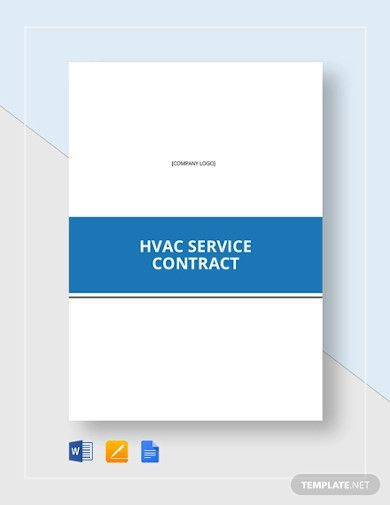
2. HVAC Maintenance Contract Tender
3. Commercial HVAC Rental Contract
4. Maintenance Contract of HVAC System
5. HVAC Yearly Service Contract Example
6. Maintenance Contract for Low End HVAC Systems
7. HVAC Contract Examples for Services
8. Sample HVAC Service Contract
What Is an HVAC Contract?
An HVAC contract is a document that legally binds an HVAC system service provider and its client regarding a specific type of HVAC-related work. The main service subjects – heating, ventilation, and air conditioning have many sub-categories when it comes to services. Stephanie Faris shared in her article for Chron that contracts help by outlining the arrangement’s scope, legally protecting the involved parties, and securing financial bargains. Therefore, no matter how complex HVAC is, a contract can narrow it down easily according to the client’s best interest.
HVAC Challenges
A few of the major challenges of the HVAC industry in 2019 include seasonality, shortage of skilled laborers, and high service delivery cost. But as another year begins, multiple industry analysis pops out and reveals the same issues and more. So what remains unsolved, and what has been added? Workforce shortage and irregular busy periods answer the first question. One cannot force an individual to take pieces of HVAC training just as one cannot force a service consumer to avail of services at random times.
The issue will further continue with more people distancing themselves from manual labor. The new issue that HVAC companies have mixed feelings about is the ceaseless technological innovation of HVAC systems, materials, and equipment. People always want maximum comfort for a minimum effort, driving developers to innovate. In the case of businesses, keeping up with fast-paced development is just too hard to achieve.
How To Create a HVAC Contract
Creating an HVAC contract is just like creating any other service contract. The only difference is the service that will be sold to a service consumer. It is very much true that preparing a contract is difficult; it gets much more difficult knowing that it is enforceable and admissible by the law. To help you in carefully setting the content of your contract, we highly recommend you refer to our prepared guidelines below.
1. Set Standard-based Outline
Service contracts follow a standard outline and format. So, the very first thing you have to do is find out what the usual pattern includes. Once the inclusions are identified, it will be much easier for you to research the things that must be taken into consideration.
2. Define Contract Sections
With the help of an outline, you have a clearer picture of the areas that complete your contract. Understanding and defining the contract sections is the next step that you have to take. Like the previous guideline, this step narrows down your research focus.
3. Enumerate Contract Stipulations
In this step, you have to put your attention in filling the contract sections revolving around your terms and conditions in performing the availed services. No matter how long and complicated they are, you have to clearly detail each of them. Vague or incomplete bid job descriptions or lists may cause confusion, or worse, disputes.
4. Specify Timeframe and Figures
Specifying a feasible timeframe and accurate figures is a must in a managed service contract. A poorly set timeframe can be a big problem not just for the client but also for your HVAC company. The same consequence will be experienced if figures, like in payments, are proven inaccurate. Always be reminded that once contracts are signed, both parties have to abide by the set responsibilities no matter the cause of delays, refusal to pay, and others are.
5. Include Indemnification and Termination Clauses
Risks are unavoidable in every service provision. This is why it is very important for your company to set certain rules and resolutions in case things didn’t go as agreed upon. For damages and injuries, indemnification strategies are available to protect both parties. Whereas for contract termination, there are always termination policies and procedures to help save the agreement.
6. Lay Aside Signature Spaces
Service contracts must be offered and accepted. All the details beforehand define the offerings. To prove that the contract has been accepted, signatures on both parties have to be imprinted. This is why allocating enough space for these important marks must never be forgotten.
FAQs:
1. What is contract fraud?
Contract fraud is a type of fraud where the contractor intentionally commits to a dishonest representation of a product or service in a contract. The act is also known as material misrepresentation.
2. When should I prepare an HVAC contract?
Individuals or organizations should prepare HVAC contracts if they plan to employ HVAC companies to repair, maintain, or install HVAC systems. Or, you provide HVAC services to individuals or organizations.
3. Is there an online contract?
Yes, there is. Online contracts do not necessarily require signatures. But if made necessary, electronic signatures are made as an alternative. For an electronic signature to be considered legal, the contract, itself, must be enforceable and admissible by the law.
The purpose of HVAC systems in our households and different working environments makes it very marketable. However, with the presence of challenges, the capabilities of HVAC companies begin to become limited and will surely create a negative domino effect. Nonetheless, businesses have to meet the market demands to profit. This is why HVAC companies have to be always ready to cater their services to consumers by having HVAC invoices, contracts, and other related documents in hand.



